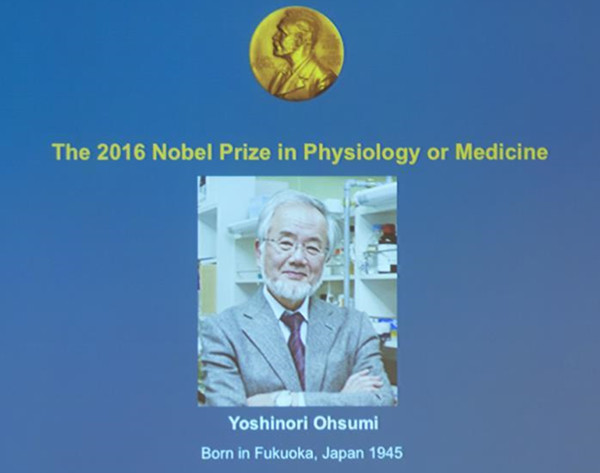
Photo taken on Oct. 3, 2016 shows a portrait of Yoshinori Ohsumi in Stockholm, Sweden. Japanese biologist Yoshinori Ohsumi has won this year's Nobel Prize for Physiology or Medicine for his discovery on how cells in the body break down and recycle protein. (Xinhua/Shi Tiansheng)
Japanese scientist Yoshinori Ohsumi won the 2016 Nobel Prize in physiology or medicine, the committee announced Monday.
The Nobel assembly at the Karolinska Institute decided to award the 2016 physiology or medicine prize to Yoshinori Ohsumi for his discoveries of mechanisms for autophagy.
Thomas Perlmann, secretary of the Nobel Committee for Physiology or Medicine, told reporters that he contacted Ohsumi right after the prize was decided, and that he was quite surprised at the news and "apparently quite pleased."
"This year's nobel laureate discovered and elucidated mechanisms underlying autophagy, a fundamental process for degrading and recycling cellular components," said the statement.
The concept of autophagy or "self-eating" emerged during the 1960s, when researchers first observed that the cell could destroy its own contents by enclosing it in membranes, forming sack-like vesicles that were transported to a recycling compartment, called the lysosome, for degradation.
Difficulties in studying the phenomenon meant that little was known until, in a series of experiments in the early 1990s, Ohsumi used baker's yeast to identify genes essential for autophagy. He then went on to elucidate the underlying mechanisms for autophagy in yeast and showed that similar sophisticated machinery is used in people's cells, said the statement.
Ohsumi's discoveries led to a new paradigm in the understanding of how the cell recycles its content. His discoveries opened the path to understanding the fundamental importance of autophagy in many physiological processes, such as in the adaptation to starvation or response to infection, it added.
"Mutations in autophagy genes can cause disease, and the autophagic process is involved in several conditions including cancer and neurological disease," said the statement.
Ohsumi was born 1945 in Fukuoka, Japan. He received a Ph.D. from the University of Tokyo in 1974. He is currently a professor at the Tokyo Institute of Technology.
After the announcement, Perlmann confirmed that this year's prize was 8 million SEK (0.94 million U.S. dollars).


















































